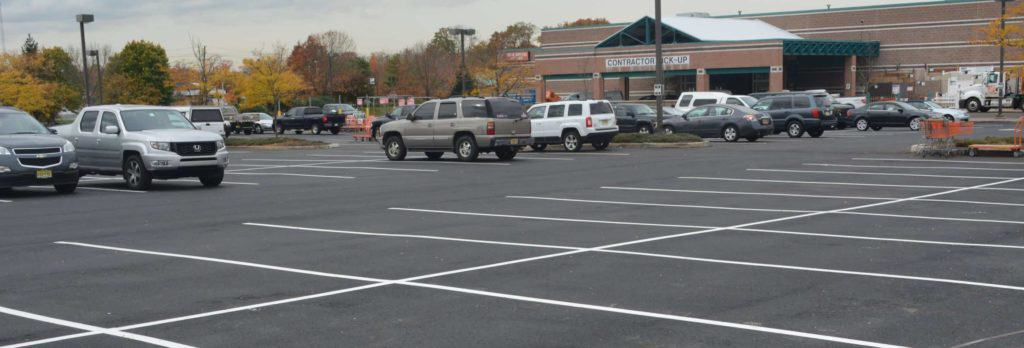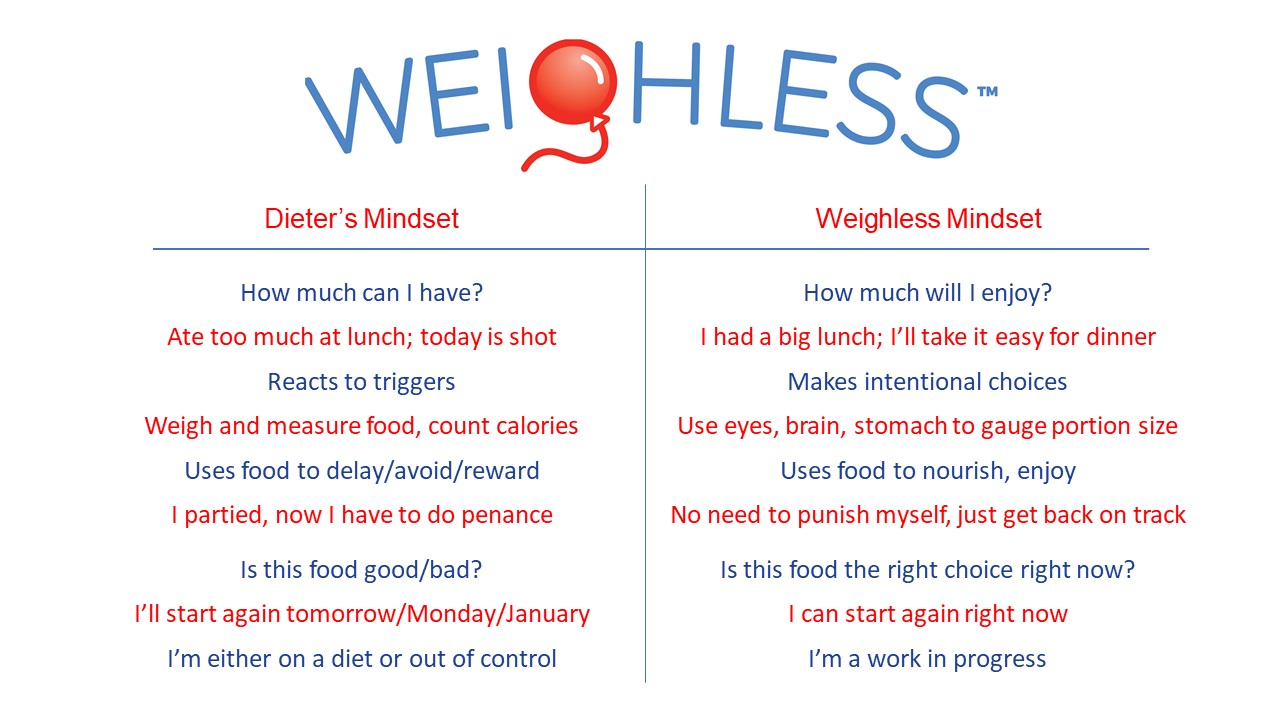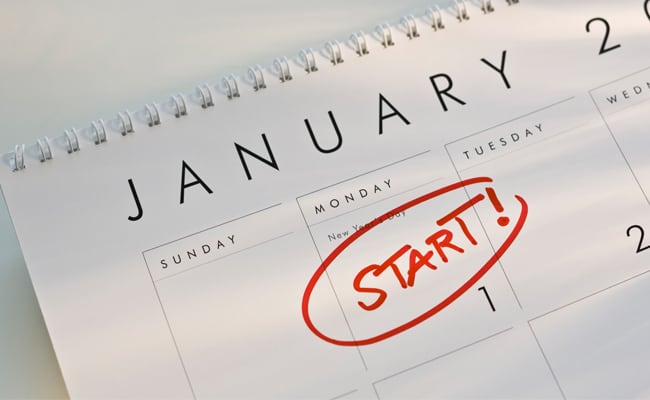Watch Part 2: What will it take?
Mindset
Postcard from the parking lot
 As I turned into the parking lot of my local grocery store, I could see that competition for parking spots was intense. A snowstorm was in the forecast, after all. And there was a football game that afternoon.
Cars were jockeying for position with their blinkers on, waiting for other shoppers to load their groceries and pull out. Others were circling like sharks, hoping to spot and claim an about-to-be-vacated spot before others could react. I could almost see the cloud of stress and frustration rising over the lot and rolling toward me.
With a feeling of relief, I banked to the right, headed to the furthest corner and pulled into one of dozens of empty spots. I collected my empty grocery bags, locked the car door, and because I happened to be wearing tennis shoes, jogged the 200 yards to the door of the grocery store.
As I turned into the parking lot of my local grocery store, I could see that competition for parking spots was intense. A snowstorm was in the forecast, after all. And there was a football game that afternoon.
Cars were jockeying for position with their blinkers on, waiting for other shoppers to load their groceries and pull out. Others were circling like sharks, hoping to spot and claim an about-to-be-vacated spot before others could react. I could almost see the cloud of stress and frustration rising over the lot and rolling toward me.
With a feeling of relief, I banked to the right, headed to the furthest corner and pulled into one of dozens of empty spots. I collected my empty grocery bags, locked the car door, and because I happened to be wearing tennis shoes, jogged the 200 yards to the door of the grocery store.
But so what?
Opting out of the parking lot drama definitely reduced my stress level. But, let’s be serious: Will the extra dozen or so calories I burned by jogging in from the corner of the lot make any meaningful difference in terms of my weight? Of course not. But it’s not about the calories I’m burning. It’s about the mindset I’m creating. Every time I purposefully choose a farther parking spot, or take the stairs, or jog across the street, I subtly reinforce (to myself) my identity as someone who chooses to be active, who makes healthy choices. And that spills over into so many other aspects of my life. Such as which foods went into the grocery cart once inside the store. What we do, say, and think really does affect how we see ourselves. And how we see ourselves affects what we do, say, and think. It can be a virtuous cycle or a downward spiral. So, the next time you find yourself questioning whether a tiny thing like parking further away from the door can ever really make a difference, remember that all of these small decisions add up to the person you are becoming. Spiral up, friends. #weighlessDieters Mindset vs Weighless Mindset
I’m guessing you’ve been on your share of diets. (And isn’t that, right there, proof that diets are not the answer?)
Although they rarely deliver permanent weight loss, diets do succeed fabulously at one thing: they’re great at creating a dieter’s mindset. And that mindset tends to follow us around, even when we’re in between diets.
What’s the dieter’s mindset? It’s a tendency to see every food as either “good” or “bad.” Even worse, it’s a tendency to see OURSELVES as “good” or “bad” depending on what we’ve eaten that day.
It’s the dieter’s mindset that puts thoughts like these into your head:
“I shouldn’t have eaten that cake after lunch. But as today is obviously ruined. I might as well go out for nachos after work.”
“I’ll be extra good tomorrow.”
“It’s sugar-free, so make it a large.”
“That’s it: No more carbs (or whatever…) until I lose five pounds.”
Ironically, that dieter’s mindset doesn’t actually help you weigh less, does it? No, it locks you in to a lifetime of dieting.
One of the most important things we do in the Weighless program is to pull that dieter’s mindset out by the roots. In place of those toxic messages, we plant ones that, over time, really do help you weigh less.

The Weighless Mindset is is about making friends with both food and yourself–and reinforcing the habits that support the life (and body) you want to have. Just ask the hundreds of Weighless members who have stopped dieting and started weighing less! Here’s some of what they have to say.
Why I’m not reading self-help books in 2018
Today, I found myself watching an interview with the author of a new book, one of those personal growth books that promises to change your life. As I listened to the interview, I was thinking: “This author seems really wise and I like her message. I could use this in my life. I should read it.”
And then I realized that I don’t need to read one more book on how to be a more authentic version of myself or make my life work better or achieve my goals.
It’s not that I know everything there is to know about these things. Far from it. But there comes a point at which reading yet another book or article or blog post or subscribing to yet another podcast or newsletter becomes a substitute for doing the work.
Analysis without action doesn’t produce change
Taking consistent action, however imperfectly, beats another month (year/decade) perfecting my philosophy and planning my approach. If I want to make more progress toward my goals, I need to quit researching and start putting some of what I already know into action. And through trial and error, I’ll learn what works for me.
This is something that we talk about a lot in the Weighless program. So much of the work we do in this year-long program focuses on mindset and attitudes: how we think about food, eating, and our choices in that regard. But, as our members quickly discover, insights are only as good as the actions they lead to. That’s why we spend an equal amount of time on concrete strategies for changing habits.
You can change your mind without changing your behavior. You can also change your behavior without changing your mind. It’s only when you manage to change both that you’re on the road to lasting success.
If you weigh more than you’d like to, and you’re ready to stop analyzing and start solving the problem, we would love to have you with us in our next group. Learn more here.
Do you have the right nutrition goals for 2018?

As 2017 winds down, a lot of us are starting to think about our goals and resolutions for the coming year. What are yours? Are you planning to “eat clean in 2018”? Give up sugar? Work out more? Eat out less? (Or maybe just eat less?)
How are this year’s goals different from last year’s?
If you find yourself re-making the same resolutions year after year, the problem may not be with you. It might be the goals.
Here are two of the most common reasons we fail to achieve our goals:
Too Vague
Eating clean certainly sounds like a good idea. The problem is that no-one really knows what it means. Similarly, goals like ‘working out more’ or ‘eating out less’ tend to falter because they are too vague. More or less than what?
Choosing goals that are specific and measurable, such as ‘getting to the gym 3 times a week,’ or will greatly increase your chances of notching a win.
Too Extreme
At the other end of the spectrum are those take-no-prisoners goals like completely eliminating sugar from your diet. Or, going from never exercising to getting up every morning at 5am to work out for 60 minutes before work.
Nothing vague or unmeasurable about these! But setting goals that are unrealistic or unattainable (for you right now) can also set you up for failure. The first time you oversleep and miss your workout, you may be tempted to bail on the whole enterprise.
Choosing the Right Goals
I’ve found that the goals most likely to be acheived tend to have the following attributes:
Incremental: If you actually cooked dinner a grand total of four times in 2017, resolving to cook every meal from scratch in 2018 is probably not an achievable goal. How about resolving to cook two meals a week? (Cook extra so that you have leftovers!)
Sustainable: I once decided that doing 45-minutes of yoga every morning would make my life better. And no doubt it would if I lived on Mars, where every day is 24 hours and 40 minutes long. Here on Earth, it turns out that I can only fit yoga in 3 times a week (which is way better than zero times.) If achieving your goal requires more time, money, or energy than you have–or can make–available, the odds of long term success aren’t good. Try to choose goals that don’t require bending the time/space continuum.
[bctt tweet=”Try to choose goals that don’t require bending the time/space continuum.” username=”nutritiondiva”]
Aligned with your values: Behavior change is always challenging. But changing your behavior because someone else thinks you should is nigh unto impossible. When considering which goals you might like to set for yourself in 2018, think about why each one is important to you and choose the one(s) that bring you closer to who and how you want to be in the world. Those are the goals that are worth pursuing.
Setting and achieving meaningful goals is a big part of what we do in the Weighless Program, a year-long group coaching program focused on behavior change and sustainable weight loss. Click here to learn more.
